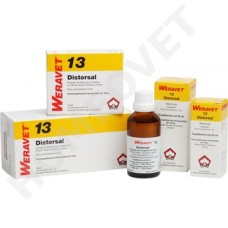Distorsal Homeopathic Ampoules and Drops for Animals
Distorsal, Homeopathic medicine for cattle, horses, pigs, dogs and cats. To use as a regulation therapy in lameness, bruises, contusions, tendonitis, joint and muscular rheumatism.
Distorsal, Homeopathic medicine for cattle, horses, pigs, dogs and cats.
To use as a regulation therapy in lameness, bruises, contusions, tendonitis, joint and muscular rheumatism.
Therapeutic indications; The indication areas correspond to the veterinary Homeopathy-Materia Medica
- Lameness in all animal species
- sprains and strains
- Contusions, bruises (contusions)
- tendonitis
- Joint and muscle rheumatism
- Sore muscles from overexertion
Active ingredients:
Rhus toxicodendron Dil. C 30
Useful information for reference and educational purposes only;
Distorsal® contains Rhus tox, poison ivy (Anacardiaceae family). The shrub is native to North America, and finds itself increasingly in European gardens. For the homeopathic preparation, the fresh leaves are used.
All parts of the plant contain a milky sap (poisonous) that turns black upon exposure to air . Rhus tox. is one of the most important polychrests. It removes the effects of colds, wetting and overexertion and it is the number one arthritis and joint remedy. Keynote is: pain is better after the animal is moving about and muscles and joints are warm. ( loosens up with activity)
Especially with horses and dogs Distorsal® has proven to be effective in the treatment of lameness. Indications in horses also include diseases such as lumbago, spavin and tendonitis. With dogs Distorsal is helpful in the treatment of osteoarthritis and disc herniations of elderly patients who are stiff when rising but loosen up with activity.
Main symptoms of Rhus toxicodendron are:
Restlessness and involuntary urge to move
Worsening in the rest and at night; on motion, the symptoms get worse at first, then get better however with continued movement to a certain degree
Effects of cold and wet, cold in heated body
Cold aggravates the symptoms
Relief from heat and sweating and rubbing and kneading
General: Great weakness, all over his body paralyzed. Great restlessness, constantly have to move. The animal appears depressed and unhappy, anxious.
Rhus toxicodendron directions of action
joints
muscles
connective tissue
peripheral nerves
skin
Rhus Tox main features:
Muscle sprains, strains
Joint stiffness
Restlessness (physically and mentally)
Better with motion
Worse first thing in the morning
Coughs from midnight til morning
Skin ailments; there may be accompanying skin symptoms which will appear like a Poison Ivy rash, red with swelling and itch
WERAVET 13 Distorsal® can be combined with other products of the company Biokanol:
WERAVET 4 Febrisal®: Feverish arthritis
WERAVET 7 Traumisal®: overexertion, muscle soreness
WERAVET 11 Dermisal®: eczema, Dermatitis
Qualitative and quantitative composition
1 ampoule (also for oral administration) of 2 ml (2010.1 mg) contains:
Medically active ingredient:
Rhus toxicodendron Dil. C 30 199,1 mg
Other components:
Sodium chloride, Water for injection
Qualitative and quantitative composition
Drops
1 ml (981,89 mg) liquid dilution for oral use contains:
Active substance:
Rhus Dil. C 30 mg 99.55
Other ingredients:
Ethanol 43% (m / m), purified water
Contraindications; none known
Use; Ampoules; For intravenous, subcutaneous and intramuscular injection. (also for oral administration)
horses 3-4 ml
cattle 3-4 ml
pigs 2-3 ml
dogs 1-2 ml
In acute conditions, the injection should be repeated after 1 – 2 days; otherwise, repetition takes place after 4 – 8 days.
Administration of the drug should not take place longer than to the complete healing of the animal. In acute or serious complaints one should seek medical advice from a Vet.
Use; Drops for oral administration
Horses, cattle 20 drops
Pigs 15 drops
Dogs 10 drops
Dissolved in the drinking water or bread or in about 10 ml of water over the feed.
2 times a day until healing, administration of the drug should not take place longer than to the complete healing of the animal. In acute or serious complaints one should seek medical advice from a Vet.

 HOME
HOME OFFERS
OFFERS NEW PRODUCTS
NEW PRODUCTS SHIPPING COST
SHIPPING COST

